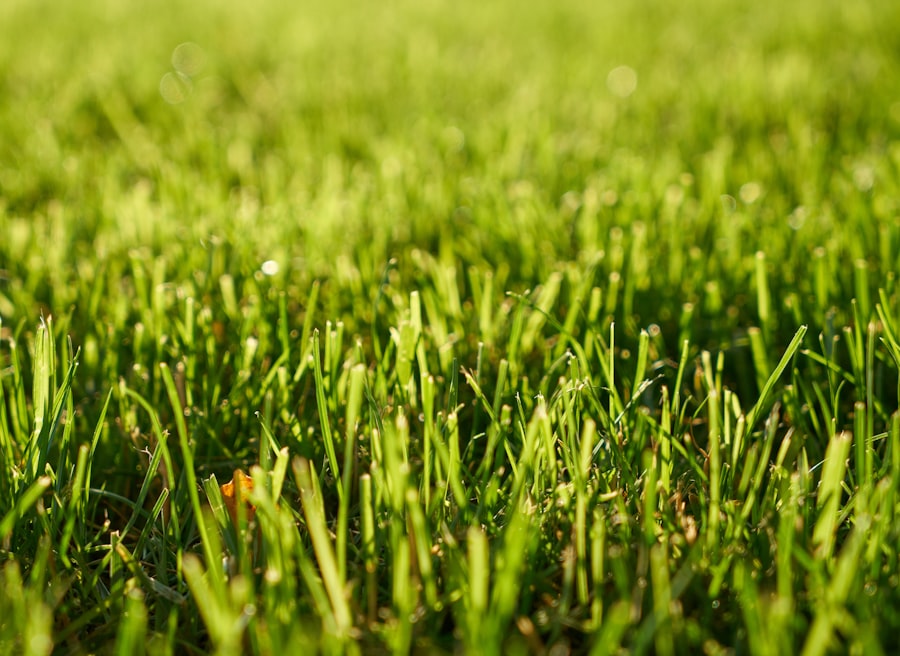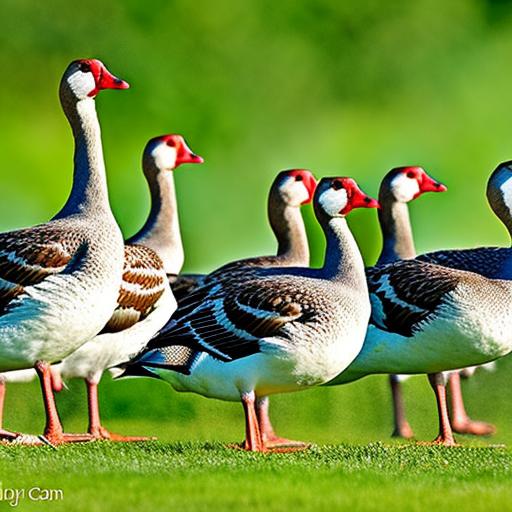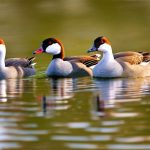Geese can be a beautiful sight to behold, gracefully gliding across a pond or flying in formation overhead. However, when these majestic creatures decide to make your lawn their home, it can quickly become a nuisance. Geese are known for their large appetites and messy droppings, which can damage your lawn and pose health risks. Finding a solution to the geese problem is crucial to maintaining the beauty and functionality of your outdoor space.
Key Takeaways
- Geese can cause damage to lawns and pose health risks.
- Physical barriers like fences and netting can prevent geese from accessing your lawn.
- Visual deterrents like decoys and flags can scare geese away.
- Audio deterrents like ultrasonic devices and noise-making machines can also be effective.
- Scent deterrents like chemical repellents and natural scents can repel geese.
Physical Barriers: Fences, Netting, and Hedges
One of the most effective ways to keep geese off your lawn is by installing physical barriers. Fences, netting, and hedges can create a physical barrier that prevents geese from accessing your property. Fences can be made of various materials such as wood, metal, or plastic, and can be designed to blend in with your landscape. Netting can be installed over ponds or other areas where geese tend to congregate, preventing them from landing or swimming in those areas. Hedges can also serve as a natural barrier, making it difficult for geese to access your lawn.
While physical barriers can be effective in keeping geese away, they do have their drawbacks. Fences may not be aesthetically pleasing and can obstruct views. Netting may require regular maintenance to ensure it remains intact and effective. Hedges may take time to grow and require regular trimming to maintain their effectiveness. It’s important to weigh the pros and cons of each option before deciding on the best physical barrier for your situation.
Visual Deterrents: Decoys, Flags, and Scarecrows
Visual deterrents are another option for keeping geese away from your lawn. These deterrents work by creating the illusion of predators or other threats that scare geese away. Decoys such as fake owls or coyotes can be placed strategically around your lawn to create the impression that predators are present. Flags or windsocks can be hung in areas where geese tend to gather, creating movement and noise that deter them. Scarecrows can also be effective in scaring geese away, especially if they are designed to move or make noise.
While visual deterrents can be effective, they may not work in all situations. Geese can become accustomed to decoys or flags if they are not moved regularly. Scarecrows may lose their effectiveness over time if geese realize they pose no real threat. It’s important to rotate and vary the visual deterrents you use to keep geese on their toes.
Audio Deterrents: Ultrasonic Devices and Noise-Making Machines
Audio deterrents use sound to scare geese away from your lawn. Ultrasonic devices emit high-frequency sounds that are unpleasant to geese but inaudible to humans. These devices can be placed strategically around your lawn to create a sonic barrier that keeps geese at bay. Noise-making machines, on the other hand, produce loud and unexpected sounds that startle geese and make them uncomfortable. These machines can be set to go off at regular intervals or triggered by motion sensors.
While audio deterrents can be effective, they may not work in all situations. Geese can become habituated to certain sounds over time, rendering the deterrent ineffective. Additionally, some audio deterrents may be bothersome to humans or other animals in the area. It’s important to consider the potential impact on your neighbors and local wildlife before using audio deterrents.
Scent Deterrents: Chemical Repellents and Natural Scents
Scent deterrents work by creating an unpleasant smell that repels geese from your lawn. Chemical repellents can be sprayed on grass or other areas where geese tend to congregate. These repellents contain ingredients that geese find unappealing, such as methyl anthranilate. Natural scents, such as predator urine or citrus oils, can also be used to deter geese. These scents mimic the presence of predators or signal that the area is not suitable for feeding or nesting.
While scent deterrents can be effective, they may not work in all situations. Geese may become accustomed to certain scents over time, rendering the deterrent ineffective. Additionally, some chemical repellents may be harmful to other animals or the environment. It’s important to choose scent deterrents that are safe and environmentally friendly.
Water-Based Solutions: Sprinklers and Water Cannons

Water-based solutions use water to deter geese from your lawn. Sprinklers can be set to go off at regular intervals or triggered by motion sensors. When geese approach, the sprinklers activate and spray water, scaring them away. Water cannons are another option for keeping geese off your lawn. These devices shoot bursts of water at geese when they come too close, creating a deterrent effect.
While water-based solutions can be effective, they may not work in all situations. Geese may become accustomed to the presence of sprinklers or water cannons over time, rendering the deterrent ineffective. Additionally, these solutions may require regular maintenance and monitoring to ensure they remain effective.
Habitat Modification: Changing Your Lawn’s Features
Habitat modification involves changing your lawn’s features to make it less attractive to geese. This can include removing or reducing areas of open water, such as ponds or fountains, which are attractive to geese for feeding and nesting. Modifying the landscape by adding slopes or uneven terrain can also discourage geese from landing on your lawn. Planting vegetation that is unappealing to geese, such as tall grasses or prickly shrubs, can also make your lawn less inviting.
While habitat modification can be effective, it may not work in all situations. Geese are adaptable creatures and may find new areas to feed or nest if their preferred habitat is modified. Additionally, modifying your lawn’s features may require time, effort, and resources. It’s important to consider the feasibility and long-term impact of habitat modification before implementing it as a solution.
Professional Services: Hiring a Wildlife Control Company
If you’re unable to find a solution to your geese problem on your own, hiring a professional wildlife control company may be the best option. These professionals have the knowledge, experience, and resources to effectively deal with geese infestations. They can assess your specific situation, recommend the most appropriate solution, and implement it for you. Hiring a professional can save you time and effort, and ensure that the geese problem is resolved in a humane and safe manner.
When choosing a wildlife control company, it’s important to do your research. Look for companies that are licensed, insured, and have a good reputation in your area. Ask for references and read reviews from previous customers. It’s also important to consider the potential costs of hiring a professional. Get quotes from multiple companies and compare their services and prices before making a decision.
DIY Solutions: Homemade Deterrents and Tricks
If you prefer a do-it-yourself approach, there are several DIY solutions you can try to deter geese from your lawn. One option is to create homemade deterrents using materials you already have at home. For example, hanging shiny objects such as CDs or aluminum foil strips can create reflections that scare geese away. Placing motion-activated sprinklers or noise-making devices around your lawn can also be effective in deterring geese.
While DIY solutions can be cost-effective and convenient, they may not be as effective as professional solutions. Geese are intelligent creatures and may quickly adapt to homemade deterrents. Additionally, some DIY solutions may not be safe or humane. It’s important to prioritize safety and consider the potential impact on geese and other wildlife when using DIY solutions.
Finding the Best Solution for Your Geese Problem
Dealing with a geese problem on your lawn can be frustrating, but there are many solutions available to help you resolve the issue. From physical barriers to visual deterrents, audio deterrents to scent deterrents, water-based solutions to habitat modification, there are options to suit every situation and preference. Whether you choose to hire a professional or try a DIY solution, it’s important to be humane and safe when dealing with geese.
Remember that what works for one person may not work for another, so don’t be discouraged if your first attempt at deterring geese is not successful. Keep trying different options until you find the best solution for your specific situation. And always prioritize the well-being of the geese and other wildlife in your area. With patience and persistence, you can reclaim your lawn from unwanted geese and enjoy a beautiful outdoor space once again.
If you’re looking for effective ways to keep geese off your lawn, you might also be interested in learning about the breeding habits of other waterfowl. Understanding the mating seasons and egg-laying patterns of different species can provide valuable insights into their behavior and help you devise strategies to deter them. For instance, guinea fowl are known for their unique egg-laying habits. To learn more about when guinea fowl lay eggs, check out this informative article on PoultryWizard.com. Additionally, if you’re curious about the incubation period for goose eggs, this article on PoultryWizard.com provides valuable information. Lastly, if you want to explore the mating season of ducks and how it relates to geese behavior, this article on PoultryWizard.com is worth a read.
FAQs
What are some effective ways to keep geese off my lawn?
There are several effective ways to keep geese off your lawn, including using decoys, installing fencing, using repellents, and modifying the landscape.
What types of decoys can I use to keep geese off my lawn?
You can use a variety of decoys to keep geese off your lawn, including fake predators like coyotes or owls, or even fake geese.
What types of fencing are effective for keeping geese off my lawn?
Fencing that is at least 3-4 feet tall and has small mesh or wire spacing is effective for keeping geese off your lawn. Electric fencing can also be effective.
What types of repellents can I use to keep geese off my lawn?
There are several types of repellents that can be effective for keeping geese off your lawn, including visual repellents like scarecrows or reflective tape, as well as auditory repellents like noise makers or ultrasonic devices.
How can I modify my landscape to keep geese off my lawn?
Modifying your landscape can include removing any standing water or other attractive features for geese, planting tall grasses or shrubs to create a physical barrier, or using landscaping features like berms or ditches to discourage geese from landing on your lawn.
Meet Walter, the feathered-friend fanatic of Florida! Nestled in the sunshine state, Walter struts through life with his feathered companions, clucking his way to happiness. With a coop that’s fancier than a five-star hotel, he’s the Don Juan of the chicken world. When he’s not teaching his hens to do the cha-cha, you’ll find him in a heated debate with his prized rooster, Sir Clucks-a-Lot. Walter’s poultry passion is no yolk; he’s the sunny-side-up guy you never knew you needed in your flock of friends!







